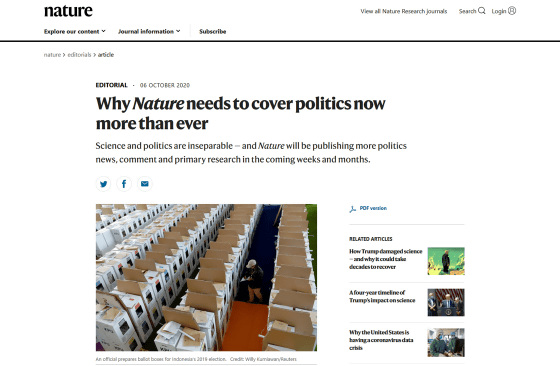'Why science and politics are inseparable,' says Nature, a long-established journal.

The British academic journal 'Nature', which has a history of more than 150 years, published an editorial entitled 'Why Nature Treats Politics More Than More' on October 6, 2020. He commented on the inseparable relationship between science and politics, referring to the news
Why Nature needs to cover politics now more than ever
https://www.nature.com/articles/d41586-020-02797-1

Nature has published news, commentary, and research papers on science and politics since its inception. For example, the US presidential election is set for November 3, 2020, and Republican candidate Donald Trump and Democratic candidate Joe Biden are in dispute. In response, Nature published an article summarizing ' what would be the impact of Mr. Biden's victory on the scientific community ' and ' the negative legacy that President Trump has left on the scientific community .'
However, every time I publish an article that contains such political content, readers often ask me, 'Why should political topics be taken up in the science journal Nature?'
Nature says, 'Science and politics have always been dependent on each other. Politicians' decisions and actions influence the priorities of research funding and research policies. At the same time, science and research range from environmental protection to data ethics. It informs and forms public policy. The actions of politicians also affect the environment of higher education, ensure that academic freedom is protected, and equality, diversity and inclusiveness. We can work to protect ourselves and work with government agencies to take the voice of the estranged community, but politicians also have the power to pass legislation that does the opposite. ' I will.

For example, the epidemic of the new coronavirus, which killed more than one million people in 2020, has pushed the relationship between science and politics to an unprecedented public position, highlighting serious problems. Research related to the new coronavirus is being conducted at an unprecedented pace for infectious diseases, how political leaders make science-based decisions, and some believe in hoaxes. There is also a strong worldwide interest in misusing science and science. Of course, the relationship between politicians and government, and the relationship between scientists and government are also changing.
'There are signs that politicians are rebelling against the principle of academic freedom, or academic autonomy,' Nature said. Academic autonomy means that even if politicians invest public funds for research, interference from politicians is not desirable until the research reaches a final conclusion, Nature said. I'm interpreting. Nature also states that the understanding that 'politicians and officials who seek advice and information from scientists cannot direct them' is part of the foundation that underpins the relationship between science and politics. ..
For example, Brazilian President Jair Bolsonaro, who had been

Nature also mentioned the news that Prime Minister Yoshihide Suga refused to appoint six scholars who were critical of the government's science policy as members of the Science Council of Japan . Nature said, 'The Science Council of Japan is an independent organization that aims to represent the voices of Japanese scientists, and the appointment was rejected for the first time since the Prime Minister was appointed in 2004. That's it. '
[Full text published in PDF] Internal document that the government approved the refusal to appoint the Science Council of Japan: Tokyo Shimbun TOKYO Web
https://www.tokyo-np.co.jp/article/60551
Nature states, 'The principle that the state respects academic autonomy is one of the foundations that underpin modern research, and when this principle is eroded, it is critical to quality standards and integrity in research and policymaking. It poses a risk. If a politician breaks this pledge, it puts people's health, the environment and society at risk. ' He continued to encourage politicians to embrace the spirit of cooperating with science, value different perspectives, and respect their commitment to academic autonomy.
Related Posts:
in Science, Posted by log1i_yk







